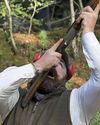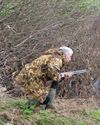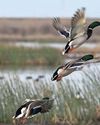
Scolopax rusticola, known to most of us as woodcock, is one of the most prized of quarries among shooting folk, probably because of its zig-zagging flight but also, I think, because when it gets up, it does so silently, with its softer feathers taking us by surprise. You can never really predict where and when a woodcock might be lurking in a wood. I have often had them spring out just six or seven feet from me when walking up or stalking in woods. Happy is the sportsman with a pin feather in his hat at the end of the day.
Responsible shooting
If we are going to shoot them, we need to do so responsibly. It is estimated that there are around only 55,000 breeding pairs of woodcock in the UK and the number has been declining, possibly due to habitat loss, due to the maturation of conifer woods planted in the ‘60s and ‘70s. In winter, we usually get a fall of woodcock from Eastern Europe and Finland, which may take the numbers in the UK to around 1.5 million. The Game and Wildlife Conservation Trust suggests not shooting woodcock until the immigrants arrive and, as responsible shooters and conservationists, I suggest we follow that advice.
Woodcock thrive in mixed woodland and younger conifer plantations. If you want to increase the chance of seeing woodcock on your shoot, opening up clearings of an acre or two in larger woods can help and good wide rides are very attractive to them too. On our little family shoot, back in the ‘60s and ‘70s, Forestry Commission land with multi-aged plantations and wide open areas, we used to see good numbers of woodcock, the resident males roding (doing their territorial display, flying in a large circular pattern).
Denne historien er fra December 2019-utgaven av Sporting Shooter.
Start din 7-dagers gratis prøveperiode på Magzter GOLD for å få tilgang til tusenvis av utvalgte premiumhistorier og 9000+ magasiner og aviser.
Allerede abonnent ? Logg på
Denne historien er fra December 2019-utgaven av Sporting Shooter.
Start din 7-dagers gratis prøveperiode på Magzter GOLD for å få tilgang til tusenvis av utvalgte premiumhistorier og 9000+ magasiner og aviser.
Allerede abonnent? Logg på

RSPB gives mixed message on shooting
Having recently attended the RSPB’s virtual AGM, Conor O’Gorman discusses the outcome of the charity’s year-long review of game bird shooting

Causeway for concern
Alan Jarrett’s renewed interest in reading takes him down memory lane to an offshore island duck flight that very nearly ended in disaster

Through a purple patch
The Garrows Estate is taking a conservation-focused approach to restoring the wildlife populations and biodiversity on the Scottish heather moorland.

When the wheels fall off
Losing form on a day’s shooting can be infuriating, especially if you’ve been shooting like a god up to that point. Simon O’Leary looks at some common causes and how to remedy them

Beaches, books & bad behaviour!
The annual Kay family vacation to Northumberland offers a chance to give the cockers a blast on the beach – although they don’t always shower themselves in glory, as Ryan Kay recalls...

Using the Stop whistle
Now you’ve instilled the basics, it’s time to up the ante with some more tricky distance work. Howard Kirby explains how to take the core Stop whistle command to the next level

The humble teal
They may be tiny, but as far as Rupert Butler is concerned, the appeal of this little duck is huge. He recalls some of his most memorable nights in pursuit of these aerial acrobats

Fab all-rounder
Mike is impressed with the Fabarm Elos B2 Field Notte, which offers great value for money, is suited to fieldwork or clays and is future-proofed for use with steel in all choke constrictions

CALL OF THE WILD
Dom Holtam reconnects with one of the purest forms of shotgun shooting as he walks-up woodcock over pointing dogs in the Scottish Highlands

A yen for the Fens
Tony Jackson recounts a memorable duck flight over an area of Fenland in Norfolk with his friend and author, the late Alan Savory